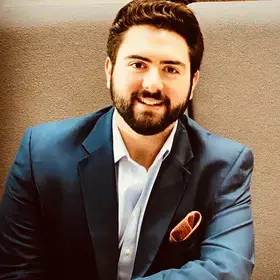“Peacebuilding is activism, not pacifism,” Saad A. Saad wrote in a piece for LinkedIn’s Pulse blog. The M.S. program in Negotiation and Conflict Resolution (NECR) alum and founder of the Arab Organization for Dialogue, Peace, & Collaboration (AODPC), was talking about the tendency of laypeople to dismiss peacebuilding as mere naivete. But both in his life and in his work, Saad demonstrates that conflict resolution involves strategy, relationship-building, and leadership. It’s a more tactical endeavor than its detractors believe, and therefore a more achievable one.
Saad was born into a region of conflict. Originally from Lebanon, his family left in 1999 due to the clashes that plagued the country. They moved to Dearborn, MI where his family was embraced by the local Arab American community.
Early in his academic life, Saad knew that he wanted to understand and explore solutions to international conflicts. He attended the University of Michigan and earned a B.A. in Social Sciences. He tells Columbia, “My undergrad study built on my life experiences in Lebanon. What I wanted to do was bridge what had experienced there with my undergraduate knowledge of political science and sociology.”
“After earning my bachelor’s,” he says, “I was looking for a program that would not only help me understand the world but actually help me go about creating change. NECR was that program.”
He relished attending an Ivy League university in the city of New York. However, he didn’t limit his learning to Columbia’s campus. “I studied abroad in South Africa, which was really fascinating. I got to work with an organization that was doing conflict management throughout the African continent. I did some of their trainings programs, I was involved in some of the work that they were doing, and also I met with some people who were on their truth and reconciliation committee in South Africa,” he says. “It was a committee that brought together the perpetrators and those who were perpetrated against. It was a phenomenal approach.”
His fieldwork also took place in his hometown in Michigan. He and two classmates, Jennifer C. Hull and Kaleigh Schwalbe, earned a 2013-2014 Advanced Consortium on Cooperation, Conflict, and Complexity (AC4) fellowship; the grant allowed him and his teammates to research the conflict responses of American Muslims and Arab-Americans in New York City and Detroit in the wake of 9/11. Their findings were fascinating: “Some individuals began to try to conceal their Islamic identity: A person whose name might be Muhammad might start going by Mike. We also found some instances in which people really began to assert their Islamic identities. After 9/11, some Muslim women who hadn't put on the headscarf now decided to wear it to show the world, ‘Yes, I am Muslim, this is what it means to me.”
Of his studies at Columbia and his fieldwork in South Africa and Detroit, he says, “I began to understand how we're socialized into believing certain things depending on the context and the environment that we're living in. I began to think about how these narratives can be oppositional and often lead to very violent and destructive conflicts.”
NECR taught him how to address these struggles not only by teaching him theory and facilitating fieldwork but also by providing lessons in leadership. “It's all about relationship-building. How do you start to connect with people? How do you handle differences with people?” These crucial insights came in handy when he founded the Arab Organization for Dialogue, Peace, & Collaboration (AODPC) in August of this year, about a year after he graduated. The organization, whose leadership also includes NECR alumna Barea M. Sinno, works toward dialogue, peace, and collaboration with regard to the constructive resolution of conflict across the Middle East and North Africa.
Saad’s enrollment in NECR was the germination of his career. He says that he pursued the program in order to understand why international clashes happen, and “how to manage them in a way that makes them less brutal to the individual and to the community.” He says of his conflict resolution philosophy, “Peacebuilding is about developing strategies beyond violence.” And by helping to heal distressed communities, he and his fellow mediators are working towards a more healthy and sustainable civil society for all.


